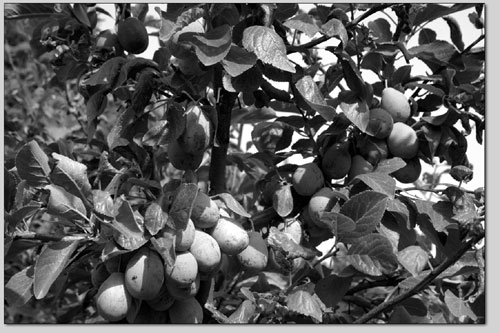| ||
Season’s gleanings
by Chef Boy Ari OK. The house is on the corner of (classified) and (classified). The owners gave permission for the tree to be picked, but they don’t get home from work until two. Before then, don’t even knock on the door because they have two yipper dogs who will go crazy. If the dogs are in the back yard, knock on the neighbor’s door and he’ll put them inside. “The tree is really tall, and I think it might be grafted, which means the upper cherries could be better than the lower ones, so if you have a ladder you should bring it. “But even if the cherries are all the same that’s OK, because they’re really good, and so far there aren’t any worms. But in this heat they aren’t going to last long so you should go soon. Do you think you can go today?” When I committed, an audible sigh of relief passed through the phone line. Another pregnant tree had been saved. But there was still much work to be done. In a manila folder marked “gleaning,” Barbara Ross has collected info on more than 100 trees, including 23 apricot, 52 apple, 16 plum and seven pear, as well as grapes, cherries and berries. When she’s out and about, she notices new ones (“how can’t you?”) with the subconscious fixation of a passing hunter spotting an elk herd on a hill from the highway at 65 mph. She sees the trees, knocks on doors and asks residents if they plan to pick. If not, most are eager to have somebody else do it, saving them a mess – or, perhaps worse, a bear in the yard. Although Ross seems tireless in doing what it takes to prevent food from wasting, she admits that it’s getting old. “I have records of pickers from over the years, but calling them all is unsatisfactory. It’s getting to be too much work. It’s best if the tree’s owner puts a u-pick ad in the newspaper.” When they do, she says, pickers come out of the woodwork with their bushel baskets and take the fruit home to their dehydrators, canners, freezers, cereal bowls and pie plates. While much of the fruit on these quasi-abandoned trees is hardly flawless, Ross isn’t afraid of a little extra protein. “I’d rather eat a worm that’s been eating cherries than some toxic fruit from the store,” she says, “but most people want to pay money for flawless-looking fruit that’s covered in wax and poison, while the natural fruit rots on the ground. “I’ve never heard of anyone getting sick from a worm in a cherry,” she adds. “Have you?” As of today, the cherries have already come and gone. The “transparent apples,” as Ross calls them – mostly green and tart early-season apples that make great pies and sweeten in the dehydrator – are in full swing. Pears, plums and fall apples are coming on as we speak. September is the month when the trees are heaviest with ripe fruit. While hundreds of apple varieties were once commonly grown, now 90 percent of commercially grown apples represent just 10 varieties. But in the back yards and alleyways of neighborhoods around Missoula, the older heirlooms still grow. While they might not have the attributes to support mass-marketability – like size and storability – these heirlooms contain a spectrum of nuance and are a treat to the true connoisseur. One connoisseur, unfortunately, is the black bear, especially in some parts of town. Drawn down from the hills and into neighborhoods by the smell of thousands of ripe apples, the bears’ presence in urban neighborhoods can create difficult conflicts. In Missoula, Mont., a group called Garden City Harvest is well known for its urban farming and gardening activities. Garden City Harvest now has its own gleaning coordinator, who will organize university students and community members to help remove those tempting dangling fruits. The apples will be turned into cider, which will be given away this fall. There is nothing like cider made from a mixture of apples, and it’s a great way to put even gnarly specimens to use. And while you can get some pretty good cider out of some pretty ugly apples, there will be some too far gone for even the cider press. But none will be wasted. The goners, Ross notes, are good for horses. •
|


